Hwyl fawrpublished at 14:22 BST 13 May
Eluned Morgan’s twenty-seventh session as first minister comes to a close.
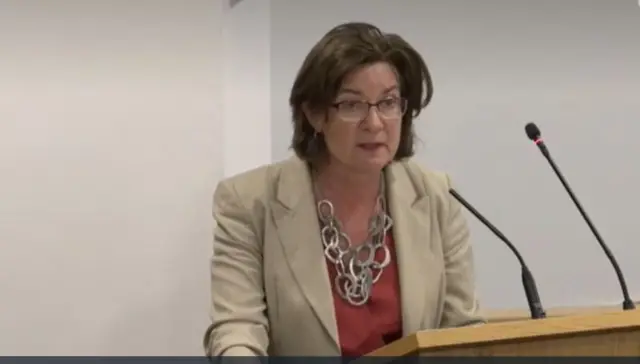 Image source, Senedd Cymru
Image source, Senedd CymruEluned Morgan
Eluned Morgan is quizzed by opposition party leaders and other MSs during First Minister's Questions.
By Alun Jones
Eluned Morgan’s twenty-seventh session as first minister comes to a close.
 Image source, Senedd Cymru
Image source, Senedd CymruEluned Morgan
Conservative Sam Rowlands asks "how is the Welsh government ensuring that north-east Wales continues to be an attractive place for businesses to invest?"
Eluned Morgan says the North Wales Corporate Joint Committee (CJC) was established to enhance strategic planning to address key regional priorities.
Sam Rowlands calls for further investment in the road infrastructure in north-east Wales.
He says "it’s been described to me that some of the trunk roads in that part of the world are overused and underinvested in, and particularly in places like the A55, the A494 and the A483, which get clogged up time and time again, slowing business down, making it less of an attractive place for investment in the future."
The first minister replies, "there is a need to work on a regional basis and that the priorities set, going forward, need to be those that are agreed by the CJCs and that they’re working together to prioritise, and it’s up to them to come up with what they think those priorities should be in north Wales."
 Image source, Senedd Cymru
Image source, Senedd CymruSam Rowlands
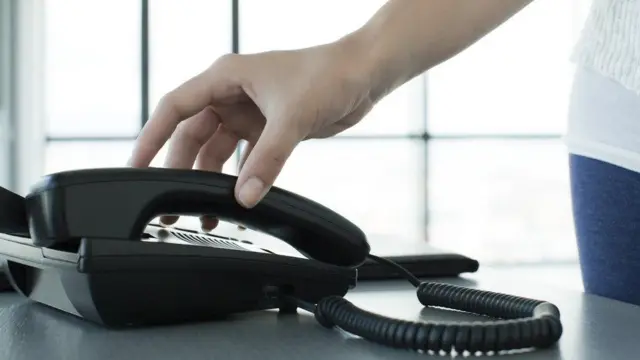 Image source, Getty Images
Image source, Getty ImagesThe digital switchover is due to be completed by the end of January 2027
Plaid Cymru MS Adam Price asks "what assessment has the Welsh government made of the impact on Welsh residents of the copper phone network switch-off?"
Eluned Morgan replies the change is being led by the industry and is a policy matter for the UK government, but a public sector readiness working group has been established in Wales.
BT, which is also responsible for EE customers, abandoned plans to force customers to switch from physical copper-based landlines to internet-based services by the end of 2025, after several incidents where telecare devices stopped working.
It will instead aim to complete the move by the end of January 2027.
Adam Price explains the move is controversial because it will mean an outage could cause landline phones to no longer work. It means there is a risk that customers who use telecare devices, which are potentially life-saving, could be left disconnected.
He says "Wales is more vulnerable to this switch-off because we have a higher percentage of older people, there is a high percentage of people living in rural communities without any fibre whatsoever."
Eluned Morgan adds, "we're very aware of the impact on things like telecare alarms, lifts and so forth. So, a lot of work is being done to prepare for this. The service switch-off is being led by the industry. The policy responsibility rests with the UK government but we have the public sector readiness working group, which has been established, and we're working jointly with the UK government. Very often, we raise questions such as how does that link up with the telecare alarms and how that links up with the power as well. So, connecting those is very important as well."
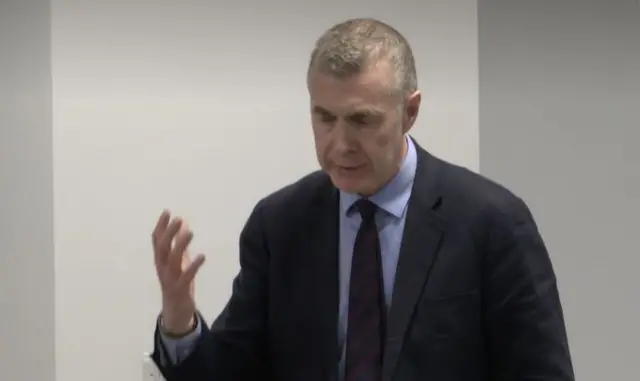 Image source, Senedd Cymru
Image source, Senedd CymruAdam Price
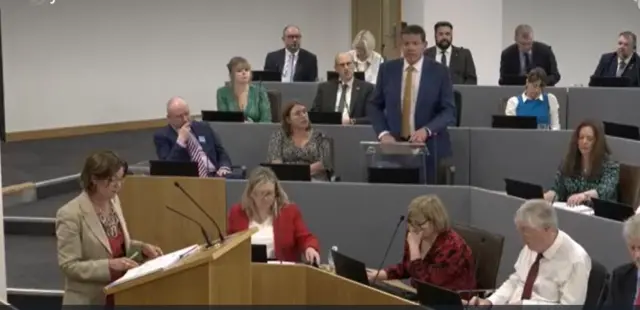 Image source, Senedd Cymru
Image source, Senedd CymruRhun ap Iorwerth
Plaid Cymru leader Rhun ap Iorwerth raises the issue of the UK government's announcement that care workers will no longer be recruited from overseas as part of a crackdown on visas for lower-skilled workers.
He says "Keir Starmer this week decided to target care workers in Labour's latest bid to out-Reform Reform, but yet another Labour lurch to the right will have potentially serious repercussions. Yes, of course we need to prioritise creating skills within our own workforce, and Plaid Cymru has long-advocated increasing wages for care workers to make the profession more attractive."
He asks "what is her plan now to ensure those reliant on the care sector in Wales aren't punished by her party's latest dog-whistle actions?"
Eluned Morgan replies "I'm not going to use divisive language when it comes to immigration; that is not the value that we have in Welsh Labour, but what I can say is that we are committed to making sure that we do our very best to ensure that we can provide a care service in Wales, and that will be more difficult if it is not possible to recruit people from abroad. These things need to be worked through. If there was a whole load of extra cash that came with it to help us to pay additional money to those care workers - and who knows, it may come - then that may make it easier to recruit people locally. So, let's see if that is something on the agenda. But I do think that we have to recognise the significant contribution that our migrant workers make to our communities, including the 38 per cent of medical consultants who are treating people in our hospitals on a daily basis."
The UK government has already tightened rules around care sector worker after coming to power last July.
Applications for Health and Care Worker visas peaked at 18,300 in August 2023, then collapsed to 1,700 by April this year following the ban on bringing dependants.
The new rules will require care companies to recruit from domestic workers or a pool of over 10,000 care workers brought to the UK on visas for jobs that never materialised.
Rhun ap Iorwerth also raises the topic of the National Wastewater Monitoring Programme. A centre at Bangor was officially opened by the then Health Minister Eluned Morgan in May 2023 before being axed with about 20 jobs lost in August that year before having the funding restored in November 2023.
Eluned Morgan says "we have provided support to the centre, but the fact is that they did excellent work during the pandemic in Bangor in terms of assessing the waste water and what's been in the water, so that we can be aware of how much Covid was present in the community, but we had to make some very difficult decisions after the pandemic because so many cuts had followed that from the Tory government. And so we had to make difficult decisions, but we are still investing in the centre".
Rhun ap Iorwerth retorts, "no, you're not. The truth is that the government has withdrawn its financial support completely, and I remember persuading the then health minister to restore following the most recent cut, and I have to do that again. Whilst other governments continue to rely on the technology, the Welsh government has gone from being one of the chief partners to playing no role whatsoever, an excellent example of silo work and working in short-term thinking that's been so characteristic of this Labour government."
Darren Millar, leader of the Welsh Conservatives in the Senedd, asks "do you agree that immigration to the United Kingdom is too high and that we risk becoming an island of strangers? And if so, do you support the proposals in the UK government's new White Paper on immigration that was published yesterday?"
Yesterday Sir Keir Starmer promised the UK Labour government's new immigration measures will mean net migration falls "significantly" over the next four years.
Eluned Morgan replies "Wales is a welcoming nation. I think we're very proud to be associated with the values of the positive things that immigration can bring and contribute to our communities and our societies, and the vast contribution that they make to our public services, in particular when we consider that about 40 per cent of the medical consultants in Wales were born outside the UK."
Darren Millar says, "we continue to see excessive numbers of people who come to settle in our country who can't speak English. They fail to integrate, some of those people, into their local communities. And I'm afraid that I agree with the prime minister that we will become an island of strangers if we don't deal with this issue."
He adds, "millions of people across Wales are concerned about this issue and raise it with you when you are on the doorsteps talking to them."
The first minister says, "I recognise that there are concerns in some of our communities, but I would point out that the levels of immigration in Wales are actually quite low. They're seven per cent across the country, and those people, on the whole, are making a huge contribution to our public services. You're more likely to be treated by a doctor from overseas than being stopped in the queue by somebody from overseas in Wales. That is the reality, and I do think it's important that we recognise that the contribution they are making to our communities is significant."
Yesterday the prime minister unveiled plans to ban recruitment of care workers from overseas, tighten access to skilled worker visas and raise the costs to employers in an effort to curb near record net migration.
He did not set a precise target, but the Home Office estimated the policies could lead to a 100,000 drop in immigration per year by 2029 - based on analysis of just eight of the core policies where "a quantitative assessment" could be made.
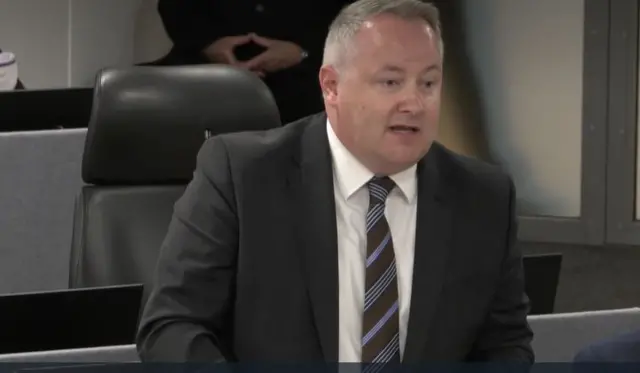 Image source, Senedd Cymru
Image source, Senedd CymruDarren Millar
Labour's Lesley Griffiths pays tribute to the "counsellors, volunteers and the whole team of Stepping Stones North Wales".
It offers support and a professional counselling service to adult survivors of childhood sexual abuse. Its services are provided free of charge and it serves the six local authorities of Ynys Môn, Gwynedd, Conwy, Denbighshire, Flintshire and Wrexham.
Lesley Griffiths says "whilst I appreciate the Welsh government budget is allocated on an annual basis, do you agree with me that multi-year funding settlements would assist organisations, such as Stepping Stones, to enable better long-term planning and provide support to many more individuals?"
Eluned Morgan replies, "in an ideal world, we'd like to see multi-annual funding. There are rules within our budgetary system that allows some of that to happen, but obviously up until very recently we’ve only had an annual funding settlement."
She says Stepping Stones were given an additional £102,000 this year to help reduce their waiting lists.
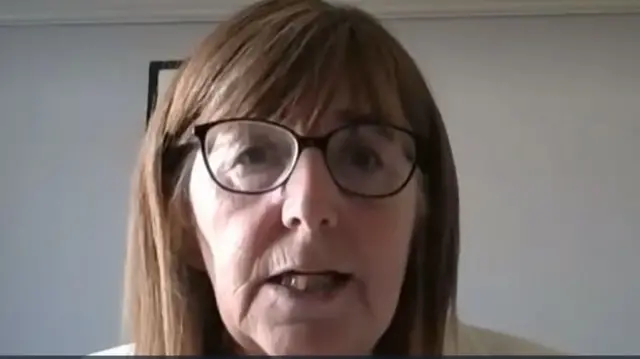 Image source, Senedd Cymru
Image source, Senedd CymruLesley Griffiths
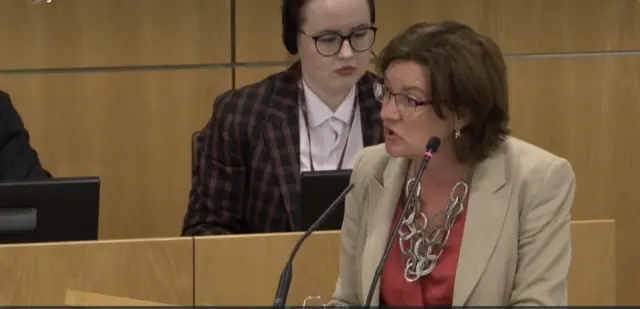 Image source, Senedd Cymru
Image source, Senedd CymruEluned Morgan
Llywydd Elin Jones conducts a ballot to determine the names of members who may table questions to the first minister.
Plaid Cymru MS Delyth Jewell asks "what action will the Welsh government take to help people in Wales affected by the UK government's welfare cuts?"
Eluned Morgan says the Welsh government will "ensure that anyone who will be affected by any reforms is able to access the help that they need. That could be support to enter and maintain suitable employment, or to receive impartial and specialist advice on their rights through our single advice fund services."
She acknowledges "there are people across Wales who are incredibly concerned about these cuts and how they may affect them. I think it is incumbent on the government at the UK level to listen to the lived experience of people, and to their concerns."
She says around 50,000 people in Wales will be affected by the changes to the personal independence payment, and out of the 10 local authorities most affected by the welfare changes in the whole of the United Kingdom, four of them are in Wales.
Delyth Jewell says "Westminster’s welfare cuts will push thousands of people into further poverty. They will punish people for being disabled or out of work. They are cruel, they are avoidable, and they are being forced through by the Labour Party."
In March, the UK government released a green paper to spell out the details of its proposed shake-up of the benefits system.
Overall, the UK government spends £65bn a year on health and disability-related benefits. Before it announced the changes to personal independence payment and universal credit, this was projected to increase to £100bn by 2029.
It estimated that 3.2 million families in the UK could be worse off as a result of the reforms, while 3.8 million families will be better off by 2030.
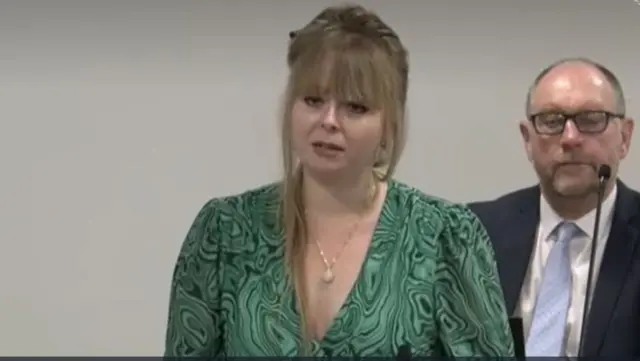 Image source, Senedd Cymru
Image source, Senedd CymruDelyth Jewell
Hello and welcome to our live coverage of Eluned Morgan’s twenty-seventh session of First Minister's Questions.
The Siambr (Senedd chamber) has closed for renovations until March 2026, as work is underway on altering it to accommodate the 96 Members who will be chosen in the next Senedd election in May 2026.
So the 60 MSs are meeting in Siambr Hywel, the original debating chamber that housed the then National Assembly for Wales from 1999 to 2006.
The meeting is held in a hybrid format, with some members in Siambr Hywel and others joining by video-conference.
You can click on the play button above to watch the proceedings from 1.30pm.
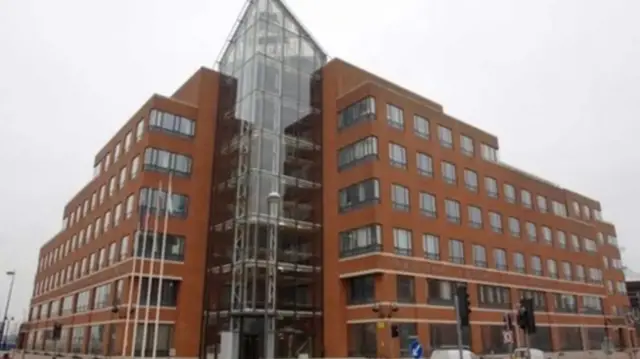
Tŷ Hywel, next to the Senedd building in Cardiff Bay, is rented by the Senedd Commission
